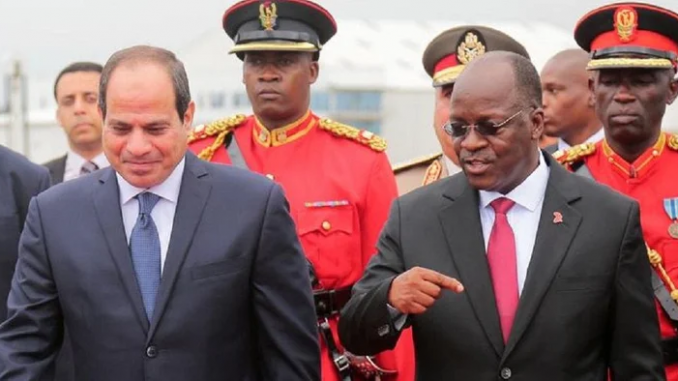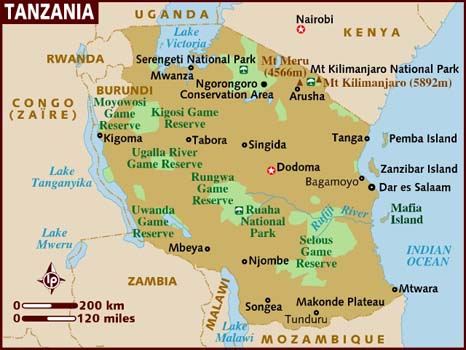Egyptian firm’s development plans in Tanzania
December 19, 2018 | Expert Insights

The Tanzanian Energy minister recently announced that two Egyptian firms, namely El Sewedy Electric Co and Arab Contractors would be involved in building a $3 billion hydroelectric plant in Tanzania. The successful development of the plant would generate more than double the country’s present power generation capacity.
Background
Both Egypt and Tanzania are Nile Basin countries and have always shared a close historical relation. In 2014, the countries celebrated the 50th anniversary of establishing bilateral diplomatic ties. It was first established when Salem Ahmed Salem former secretary-general of Organization of African Unity became the first Tanzanian ambassador in Egypt in 1964 after the unity between Tanganyika and Zanzibar. The bilateral diplomatic relations are historical since the era of the first Tanzanian president Julis Nyerere and late president Gamal Abdel Nasser.
In October 2002, the countries had signed an agreement for the establishment of a Tanzanian - Egyptian Business Council between the Egyptian Businessmen Association and Federation of Chambers of Commerce, Industry and Agriculture of Tanzania. In 2015, the two countries concluded the negotiations on the abolition of customs duties on intra - trade in the context of the establishment of a tripartite free trade zone between the major economic blocs of Africa: "COMESA, SADC, and the East African Community" which was signed during Sharm El -Sheikh Summit in 2015.
During the 28th African Union Summit in Addis Ababa in January 2017, President Abdel Fattah El Sisi met his Tanzanian counterpart President John Magufuli, where President El Sisi expressed Egypt’s desire to develop cooperation with Tanzania in all fields which included increasing the volume of economic cooperation and trade between the countries. The president also affirmed the importance of intensifying coordination between the two countries amidst the existing common challenges they face.

Analysis
In a recent announcement, Tanzania is set to build a $3 billion hydroelectric plant in a UNESCO world heritage site under a contract involving Egyptian companies.
The Tanzanian Energy minister said that the two Egyptian companies, El Sewedy Electric Co and Arab Contractors will be involved in building the hydroelectric plant, which could double the country’s present power generation capacity. Representatives of state-run Tanzania Electric Supply Co, El Sewedy and Arab Contractor signed the agreement in the presence of President John Magufuli and Egyptian Prime Minister Mostafa Madbouly. The minister on state television said that the plant would have an installed capacity of 2,115 megawatts.
President Magufuli said: “When we asked for financing for this project, the lenders refused to give us money but thanks to improved tax collection, we are able to finance this project using our own resources”. Consequently, the monthly tax revenue in the country has increased on an average of 1.3 trillion shillings ($566 million) per month. Under Magufuli’s presidency, the country has indeed seen a significant increase in revenue collection. As before he came to power in late 2015, the average revenue was 850 billion.
According to El Sewedy, the Arab Contractors will hold a 55 percent stake in the project, and El Sewedy will hold 45 percent. It expects the project to take 42 months to complete and production to start by April 2022.
President Maufuli added that "The dam will become a major source of water and the cheap electricity to be produced from the dam will reduce the number of people who cut trees for firewood”. However, Magufuli called on the Arab Contractors engineering company to on finish the project ahead of schedule and said that he would be thankful in case the company managed to meet his demand.
Counterpoint
Though the plant is economically beneficial to the country, the Selous Game Reserve that covers 50,000 square km of one of the largest protected areas in Africa, according to UNESCO will be at serious risk. The wildlife area is home to elephants, black rhinos and giraffes.
The World Wildlife Fund conservation group said based on a report published in July last year the proposed large-scale hydropower dam “puts protected areas of global importance, as well as the livelihoods of over 200,000 people who depend upon the environment, at risk.”
However, Magufuli dispelled these environmental concerns and said that Tanzania had allocated 32.5 percent of its total land mass to conservation.
Assessment
Our assessment is that the development of the hydropower plant will cement a firm platform for both Egypt and Tanzania to further enhance their economic cooperation. However, we believe that the building of the dam must not come at the cost of destroying a large portion of the reserve that is essential for both maintaining human and animal lives.
We feel that the increasing Egyptian initiatives to engage in development projects with other African countries displays the countries vision and commitment to play a pivotal role in pan African economic development.








Comments